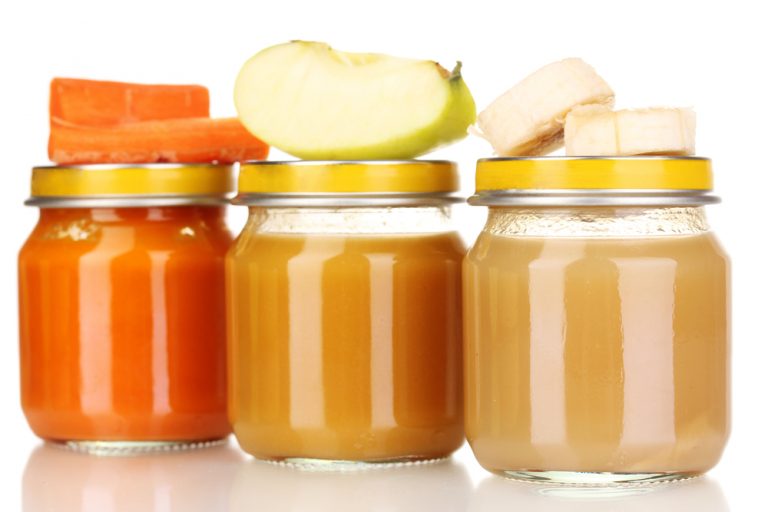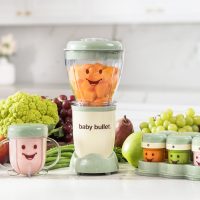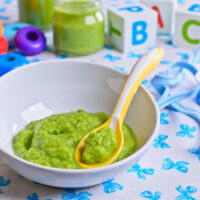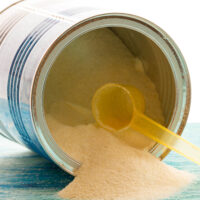Apples, peaches, and pears are common introductory baby foods. But, did you know that they are on the EWG’s “Dirty Dozen” list of the 12 fruits and vegetables that contain the most pesticides? If you want to limit your baby’s exposure to harmful chemicals in food while doing something better for the environment, then choose organic baby food. Here are the best organic baby food brand choices. From fruit and veggie pouches to cereals and snacks, we’ve got you covered.
Only Certified Organic
Thankfully, strict regulations determine what are consider organic foods in the United States. If lableled “certified USDA organic,” you know that stringent criteria must be met for how the food is grown, handled and processed.
Other organizations that certify organic products include QAI, Oregon Tilth, CCOF, and other third-party certifiers.
Organic agricultural products are grown in soil that has been free of pesticides or chemicals for at least three years (source).
Look out for labels that claim “made with organic apples” instead of specifying “certified organic” with the USDA organic seal. The apples may be organic, but other ingredients may not be!
Best Baby Food for Stage 1 and Up
Baby foods come in one of four stages. Developmental readiness can differ for each baby, so we chose brands that offer a variety of food types and textures. Most companies offer simple options for first-time eaters, but food blends and complex textures for older infants.
Confused about the stages? Here’s a quick guide:
- Stage 1: Beginner foods. These are very smooth in texture, and often more watery. The choices at this stage are basic single-grain cereals, fruits, and vegetables (i.e. apples, bananas, peas, carrots). These are suitable for babies 4-6 months old. It is not recommended to introduce foods prior to age 4 months (source). Infants who are exclusively breastfed would begin Stage 1 foods at 6 months old.
- Stage 2: Purees. Once a baby can sit alone in a highchair, and has mastered the basic foods without allergic reactions, it is time to move on to blends with more flavor and texture. Foods at this stage combine new flavors with tried-and-true ones. These purees may have added grains such as quinoa. Six month old babies will be ready for these baby foods if they began first-foods at 4 months old. Infants who started later will be ready for Stage 2 foods around eight months old.
- Stage 3: Advanced Purees. At this point, baby is making early attempts to chew! Stage 3 foods have a chunkier and thicker texture, as well as new foods like yogurt, meats, and beans. Baby is often crawling and wanting to self-feed by this point, so it’s a great time to introduce snacks and puffs. These foods are suitable for babies 9 months or older.
- Stage 4: Toddler Food. By the first birthday, toddlers are ready for real food! Most can eat many of the same foods as their parents if appropriately cut into smaller pieces. Commercial toddler foods consist of meals, snacks, or thick purees with hearty ingredients. Suitable for children 12 months and up.
Best Organic Baby Food Pouches
Although we included a few jarred options on this list, for the most part, we chose baby food pouches.
Why? Convenience! Pouches are just easier to take on-the-go. They take up less space, and eliminate the worry about glass breaking in the diaper bag. And, in a pinch, older babies can slurp the food right out of the pouch, so no need for bowls and spoons.
Unfortunately, most pouches aren’t recyclable. Some manufacturers are striving to develop recyclable versions in the next few years.
If you want more jarred options, check out the best store-bought baby food.
Best Baby Food Brands
Like a lot of foods, there are many organic baby food brands. On this list, you’ll only find those I feel are the most reputable ones.
Earth’s Best organic baby food is a favorite (maybe because of the word “best” in the name?), as well as Happy Baby and Plum Organics baby food. Gerber Organic and Beech-Nut Organic are two other popular brands that are easy to find in stores.
The other brands included on this list are also trusted, albeit lesser-known.
Although we did not include generic store brands such as O Organics, Simple Truth, and Parents Choice Organic, it doesn’t mean that they are inferior products. They were only excluded because they are more difficult to find at major retailers.
Baby Food Brands to Avoid
After a recently published study revealed that harmful heavy metals are present in nearly all baby foods on the market, many parents want to know which are more likely to contain these contaminants.
Frighteningly, after 61 brands were tested, 95% of them showed traces of heavy metals, including cadmium, lead, mercury, and arsenic. These contaminants occur naturally in a variety of foods, but also end up in commercial baby foods during processing (source). One in four baby foods contained all four of these! The concern is that these metals adversely affect brain development.
Rather than avoiding a specific baby food brand, the study suggests the following steps to reduce your baby’s exposure to harmful heavy metals:
- Switch from rice-based snacks and puffs to those made with other grains
- Use fresh, frozen foods as teethers instead of teething biscuits or rice rusks
- Choose oatmeal or multigrain baby cereal over rice versions
- Give your baby water (over age 6 months), breastmilk, or formula to drink instead of fruit juice
- Include a variety of fruits and vegetables in baby’s diet, and limit servings of carrots and sweet potatoes to one serving per day
Making these choices, instead of brand avoidance, can reduce your baby’s exposure by as much as 93%!
FAQs – Organic Baby Food
What is the best organic baby food?
Any food that has the USDA certified organic label is good organic baby food!
Beyond that, you’re simply looking at differences in flavors, prices, and labeling.
Many parents claim that cold-pressed baby food is the best option because it maintains the most nutrients. The Once Upon a Farm variety is our favorite cold-pressed organic baby food.
What is the healthiest baby food?
Simple purees without additives are going to be the healthiest baby foods.
Any processed food, such as snacks or meals, often contain preservatives, salt, or even sweeteners. Look for a clean ingredient label that features nothing but organic fruits, vegetables, and other whole foods.
Is organic baby food better?
The use of pesticides and other chemicals on food for human consumption is concerning for many. It is unknown whether or not the human body is able to flush out residue from consumed pesticides. Some studies have shown an association of pesticides with cancers and other medical issues (source).
Because organic foods are inherently non-GMO, many families choose them in order to avoid consuming genetically modified foods.
While there are no definitive answers on whether GMOs are harmful to the human body, many people prefer to err on the side of caution, eating only clean, non-genetically modified ingredients that they know to be safe.
One thing on which many experts agree is that organically grown foods have no nutritional advantage over those grown conventionally. So, even if baby doesn’t eat all organic baby foods, there is no concern about nutrition.
Every parent wants to give their baby what is best, and, for many, this means only organic baby food. With no chemicals used in the growing or processing, there is just pure nutrition for your sweet little babe.
What is cold-pressed organic baby food?
Cold-pressed organic baby food is made using a high-pressure system instead of heat to process, package, and pasteurize the baby food.
Traditional baby food-making methods include high-heat cooking, adding it to packaging, and heat pasteurizing to help kill any bacteria. While this is an effective method, some people believe this process reduces the nutrient levels of the food.
In theory, cold-pressing maintains the nutrients while still providing safe and delicious foods for your baby. Research, however, has failed to prove that cold-pressing enhances the nutritional value (source). These foods also have a shorter shelf-life because cold pasteurization is slightly less effective.
Are organic baby food pouches better than jars?
It’s a matter of personal preference. Pouches are certainly more convenient and readily available, but jars are recyclable and reusable.
When deciding, just consider what’s more important to you. If convenience and the ability to let your baby self-feed is more important, go with baby food pouches. If environmental responsibility is more important, choose a jarred foods or those with a recyclable pouch.
Does organic baby food need to be refrigerated?
Cold-pressed organic baby food is the only type that absolutely must be refrigerated. Nutrient levels also drop over time, and when stored at room temperature (source).
Any other organic baby foods may be refrigerated to help improve flavor and texture. For my infants, this was especially true for baby yogurt products. In addition, many babies prefer cold foods when they are teething because it soothes sore gums.
The Final Word
Any organic baby food on this list will leave your baby well fed and cared for. While I can’t choose the best organic baby food for your family, I can tell you what I feed my kiddo.
Whenever possible, I prepare homemade organic baby food using a cookbook. I simply dice and cook extra organic potatoes or other vegetables while making the family dinner, then puree them with an immersion blender. This can feed my baby for a couple of days.
But, as a work-from-home mom of three, there isn’t always time to make fresh food for my baby. Some days, I’m just plain tired, and need someone else to make baby’s dinner for me!
My favorite organic baby foods are made by Earth’s Best Organic. I have confidence in their food quality and nutritional value for my baby. And, it’s affordable for my family.
No matter what brand you choose, opt for healthy ingredients that are certified USDA organic. Whenever possible, recycle the pouches, caps, jars, and lids.
What organic food does your baby like? What flavors or brands do they refuse to eat? Drop a comment below, and let us know!






